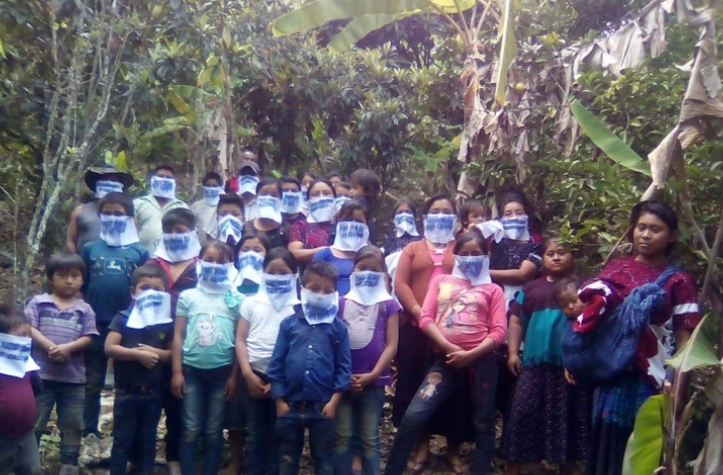
Photo: Desinformémonos.
By Magdalena Gomez
The post-Covid period presents enormous challenges, like the situation of the indigenous people of the Americas. We had better prepare ourselves to anticipate thinking (reflections) and proposals about problems that, being historical and structural, find no room in the gaze of the reconverted national states in contexts of neoliberalism and globalization.
Jesuit priest, Javier Ávila, with many decades of accompanying the Rarámuris, pointed out: “These times and these emergencies are neither of today or of yesterday; they are those of always. Unfortunately, our answers are also neither of today or yesterday, but those of always. We continue to seek out how to attack the effects, leaving the causes untouched. How can those in a community be asked to isolate, when everything of importance is done in community, celebrating together, planning together, working together, and organizing things between everyone? This is the only way to do justice, to celebrate the feast, to organize, and you cannot ask someone whose sustenance is found outside of her home to stay in her home. She will die before that, and not of the pandemic. They express other fears, not of dying, but of hunger, of pain, of injustice, of the loss of liberty and autonomy.”
As many peoples of South America reiterate this, he claims that imposing a neoliberalism violating the human rights of the indigenous people and of nature is genocide (Dialogues of the Worldwide Meeting on Human Values, 6/12/20.) So, the clear link between the historical quarantine of the peoples and the State is established, and an issue that must be reconceptualized has opened up — neogenocide.
The context of the pandemic, where where the link between the health catastrophe and the climate crisis is evident, forces us to listen to the cry for help broadcast from the Amazon about the imminent risk of genocide. The Coordinator of Indingenous Organizations of the Amazon Basin warns of the grave situation of the peoples in a vast, jungle territory with a vulnerable, dispersed, and mostly indigenous population, deficient in hospital networks and under the jurisdiction of the nine countries of the basin (Brasil, Bolivia, Colombia, Ecuador, Perú, Venezuela, Guayana, French Guyana y Surinam).
For example, in Brazil, the villages cannot do social isolation, as they are largely deforested lands, invaded by miners, loggers and land-grabbers. Next to the transnational capital, the wildfires have been devastating. The mayor of Manaus, capital of Amazonas, has reiterated the risk of genocide in a logic opposed to that of President Bolsonaro: “Each indian that dies carries with him/her a part of history, that is not written but shared orally from generation to generation. If those Indians were to die, we would be losing more than ten thousand years of indigenous civilization in our región, and that would be unforgivable.”
In Mexico, some will say, we aren’t like Amazonia, from their gazes of veiled racism and/or interests placed in a political project not authored by the people — the so-called Fourth Transformation — just as in the previous ones (were not authored by the people). With the pandemic, the exact impacts on the (indigenous) peoples are not known, only in terms of the numbers of infected and deaths, as they are not an explicit factor for attention. The crisis is lived in terms of the almost non-existent access to healthcare, insecurity and displacement. No compelling official response exists. However, if we situate the historical quarantine, that of the pre-Covid, we observe the indigenous peoples in Mexico confronting the “essential” mega-projects, like the Tren Maya and the trans-Isthmus corridor, as well as the mining concessions. We find that in general the official decisions are made in the name of the supposed progress, regardless of the hypothetical beneficiaries of that progress. The people and their organized communities call them projects of death, as they are attempts against their self- determination, and favor their disappearance. Meanwhile, they and their followers are officially branded as deniers of progress. Beyond the fallacies that are foisted upon the indigenous resistances, we have the official ones: from that it is only a train to, we won’t cut a single tree for the Mayan Train; and then we are exempt from the environmental impact statement, to later requesting it (the EIS) and counting the thousands of trees that will be cut.
There is still no progress in the logic of recognizing neo-genocide, since, as we know, the crime against humanity was defined as genocide in the context of the mass extermination of European Jews by the German Nazis. That origin has led to a refusal to conceptualize as such the many crimes and extermination policies of yesterday and today.
This opinion piece was originally published in Spanish in La Jornada on June 23, 2020. https://www.jornada.com.mx/2020/06/23/opinion/ This English interpretation has been re-published by Schools for Chiapas.
